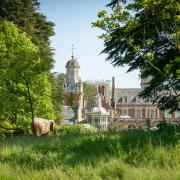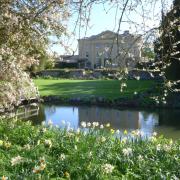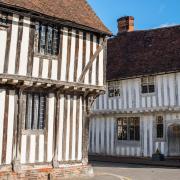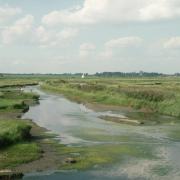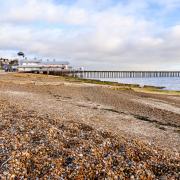Who can afford a West End theatre ticket these days? Who cares, when there are great regional theatres, like the Fisher in Bungay, to go to. David Green talks to its manager Laila France

Laila France is a female in what had, until recently, been a totally male world. She is the first woman to manage the Fisher Theatre at Bungay since it was established in the town in 1828, when the first play performed was The Belle’s Stratagem.
The theatre, which retains its Georgian splendour, is now celebrating the tenth anniversary of its re-opening. Laila, who revelled in an artistic upbringing, follows in the footsteps of seven men who, one after another, have been manager in those years.

Born in London, she grew up at Somerleyton after her father, a ballet dancer in his early career, performed at Snape Maltings and fell in love with Suffolk. The family later moved to Gillingham, near Beccles, where Laila was a pupil at the village school before attending Worlingham Middle School and then All Hallows convent school at Ditchingham and, finally, Norwich High School.
“Ever since I was little I was interested in music. I was the youngest member of Beccles church choir at the age of five and I also did ballet classes.
“I had a very artistic upbringing because my dad has always been interested in music, dance and theatre. We didn’t have a TV for years and just used to listen to music. My brother and I used to devise our own plays.

“My first leading role was at the age of seven when I played Hans, the shoemaker, in the school production of The Elves and the Shoemaker. I learned the whole play and used to tell everyone what their lines were.”
At the University of York, where Laila studied for an English degree, she was a member of the drama society and took roles in productions, which included Dr Faustus, Jesus Christ Superstar, Oh What a Lovely War, Look Back in Anger and Blood Wedding. After university, she got her first opportunity in TV and the media, working as a runner and researcher on Channel 4’s The Big Breakfast. Then she entered the world of TV and film production before returning to Suffolk to work at the Aldeburgh Festival as programme editor and concert manager’s assistant.
“I was meeting all the performers, making sure everything was as they wanted it to be, and then running the event. It was good experience.” She later worked at the Britten-Pears Library at Aldeburgh, then returned to London to work for the Saatchi advertising and PR firm, handling clients which included the Royal Opera House and the Royal Ballet.
“But life in London was all about who you were, what was your status, how much you were being paid and where you lived. It wore me down,” Laila says. After three years she returned to Suffolk.
“I think I’d had enough of London. It had become a grind. I don’t really buy in to a materialistic lifestyle and there was always real pressure to be climbing the ladder.” Until becoming Fisher Theatre manager in the spring of this year, she worked as a support co-ordinator for people with severe and acute mental health problems.
“I had suffered for some time with depression and I wanted to help others. Also, living in Suffolk I find nature and just being here much more helpful. Being out of the London rat race feels good.” She met her husband, Darren, when they were both acting in a play called Our Country’s Good, staged at The Cut arts centre at Halesworth. The couple have been involved for many years with running the Fisher Youth Theatre group and Laila recently took 16 local teenagers to perform at a drama festival in Belgium.
Apart from the full-time job of running the Fisher Theatre, with assistant Cory Minns, Laila is studying part-time for an MA degree in applied theatre. She is one of only three paid members of staff. The Fisher receives no operational funding and relies on a team of enthusiastic volunteers to survive. Laila’s very keen to increase the theatre’s income from donations, and one idea is to invite a discretionary £1 donation with each ticket sold, rather than increase ticket prices.
“If people were also able to gift aid it, it would make a real difference to the future of the Fisher,” Laila says. Her other aim is to increase the Fisher’s educational output and to revive its own adult theatre company.
“I’d like to build a connection between the theatre and every part of the local community, to encourage people of every background to be part of the arts and have the opportunity to express themselves.”
Changing fortunes
The Fisher Theatre at Bungay was one of 13 in East Anglia designed and built in the early 19th century by David Fisher, whose Norfolk and Suffolk Company of Comedians involved several members of his own family.
The common people sat on rough benches while the most spacious seats were provided for the gentry, in two tiers of private boxes. While local townsfolk queued eagerly down the side of the building, ready to squash into the pit or the gallery, the gentry would enter through the big front doors, personally welcomed by David Fisher.
Touring theatres were badly affected by the coming of the railways and, in 1844, the Bungay theatre was sold. For most of the 19th century it was the town’s Corn Hall and a venue for meetings. Later it became a cinema and was used for a variety of entertainments and commercial enterprises, including a steam laundry for many years. It ended the 20th century as a textile warehouse.
The resurrection of this ‘house of entertainment’ was started in 1995 with the formation of the Bungay Arts and Theatre Society (BATS) by five local residents convinced that the town needed an arts centre. Attention was quickly focused on the old Georgian theatre building, and after much fundraising it was bought for the town in 2001.
BATS, now a charity, began the daunting task of raising sufficient funds to transform a very dilapidated historic shell into a high-tech centre for all arts. An army of volunteers, a large board of trustees, loyal audiences clutching blankets and hot water bottles, hard won grants, generous donations and huge helpings of stubborn determination led to the re-opening of the theatre’s big blue doors in 2006 as a registered not-for-profit charity receiving no on-going revenue funding.




